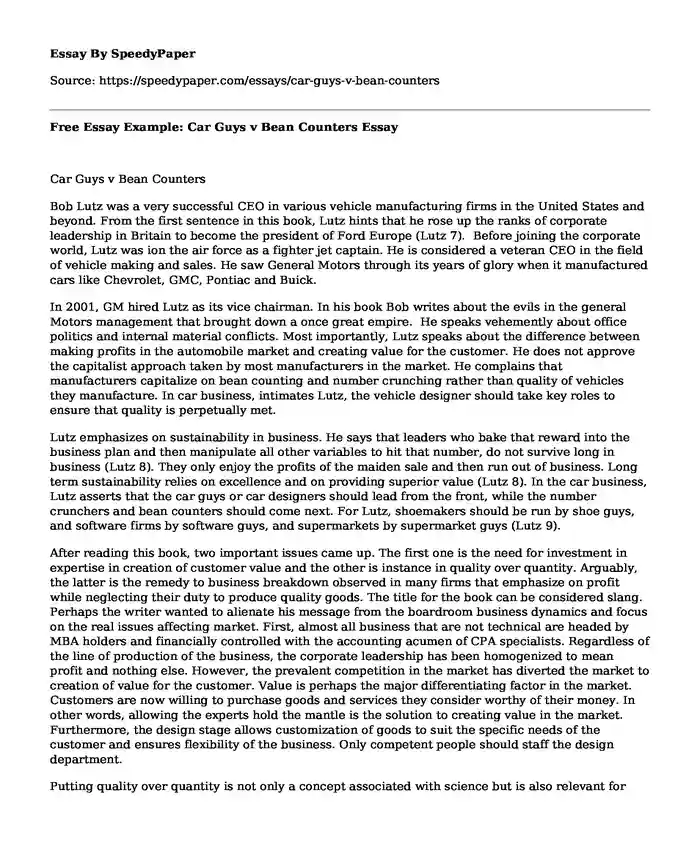
| Type of paper: | Essay |
| Categories: | Business Literature Analysis |
| Pages: | 3 |
| Wordcount: | 784 words |
Car Guys v Bean Counters
Bob Lutz was a very successful CEO in various vehicle manufacturing firms in the United States and beyond. From the first sentence in this book, Lutz hints that he rose up the ranks of corporate leadership in Britain to become the president of Ford Europe (Lutz 7). Before joining the corporate world, Lutz was ion the air force as a fighter jet captain. He is considered a veteran CEO in the field of vehicle making and sales. He saw General Motors through its years of glory when it manufactured cars like Chevrolet, GMC, Pontiac and Buick.
In 2001, GM hired Lutz as its vice chairman. In his book Bob writes about the evils in the general Motors management that brought down a once great empire. He speaks vehemently about office politics and internal material conflicts. Most importantly, Lutz speaks about the difference between making profits in the automobile market and creating value for the customer. He does not approve the capitalist approach taken by most manufacturers in the market. He complains that manufacturers capitalize on bean counting and number crunching rather than quality of vehicles they manufacture. In car business, intimates Lutz, the vehicle designer should take key roles to ensure that quality is perpetually met.
Lutz emphasizes on sustainability in business. He says that leaders who bake that reward into the business plan and then manipulate all other variables to hit that number, do not survive long in business (Lutz 8). They only enjoy the profits of the maiden sale and then run out of business. Long term sustainability relies on excellence and on providing superior value (Lutz 8). In the car business, Lutz asserts that the car guys or car designers should lead from the front, while the number crunchers and bean counters should come next. For Lutz, shoemakers should be run by shoe guys, and software firms by software guys, and supermarkets by supermarket guys (Lutz 9).
After reading this book, two important issues came up. The first one is the need for investment in expertise in creation of customer value and the other is instance in quality over quantity. Arguably, the latter is the remedy to business breakdown observed in many firms that emphasize on profit while neglecting their duty to produce quality goods. The title for the book can be considered slang. Perhaps the writer wanted to alienate his message from the boardroom business dynamics and focus on the real issues affecting market. First, almost all business that are not technical are headed by MBA holders and financially controlled with the accounting acumen of CPA specialists. Regardless of the line of production of the business, the corporate leadership has been homogenized to mean profit and nothing else. However, the prevalent competition in the market has diverted the market to creation of value for the customer. Value is perhaps the major differentiating factor in the market. Customers are now willing to purchase goods and services they consider worthy of their money. In other words, allowing the experts hold the mantle is the solution to creating value in the market. Furthermore, the design stage allows customization of goods to suit the specific needs of the customer and ensures flexibility of the business. Only competent people should staff the design department.
Putting quality over quantity is not only a concept associated with science but is also relevant for business. Lutz complains about how Ford Europe produced cheap crank shafts that could not see a vehicle through its warranty period. When he raised this issue with the bean counters, he was told that he punched hole into $50 million profit prospects. This indicates the rot present in the corporate sector. There is very little if any emphasis on customer satisfaction. What matters for business is the profit they make. Obviously, a customer does not buy goods from a company that is not consistent with quality. Furthermore, producing low quality goods taints the image of the company as customers exchange word of mouth. Similarly, customers can spread the goodness of a business to their peers and create popularity for the business. Therefore, insisting on quality is the pathway to sustained profitability of a business.
The message passed across in this book is very critical for managers. Although Lutz was not considered a bottom line but a lousy businessman, he was right with the idea of quality. His message is applicable for small and upcoming businesses as well as those businesses that have been in the market for a long time but are facing competition due to upcoming new technologies and players in the market.
Work Cited
Lutz, Bob. Car guys vs. bean counters: The battle for the soul of American business. Penguin, 2011.
Cite this page
Free Essay Example: Car Guys v Bean Counters. (2017, Sep 04). Retrieved from https://speedypaper.com/essays/car-guys-v-bean-counters
Request Removal
If you are the original author of this essay and no longer wish to have it published on the SpeedyPaper website, please click below to request its removal:
- Free Essay Sample on Baccalaureate Degree in Nursing
- Tips For Successful Interview Essay Samples
- Discretionary Action Research Paper Example for Free
- Essay Example on the High Cost of Low Morale
- Eccay Example on Naval Architecture
- Free Essay on Employment Branding Policy that Focuses on Branding
- Free Essay. Language Development and the Goals of Language Instruction
Popular categories




